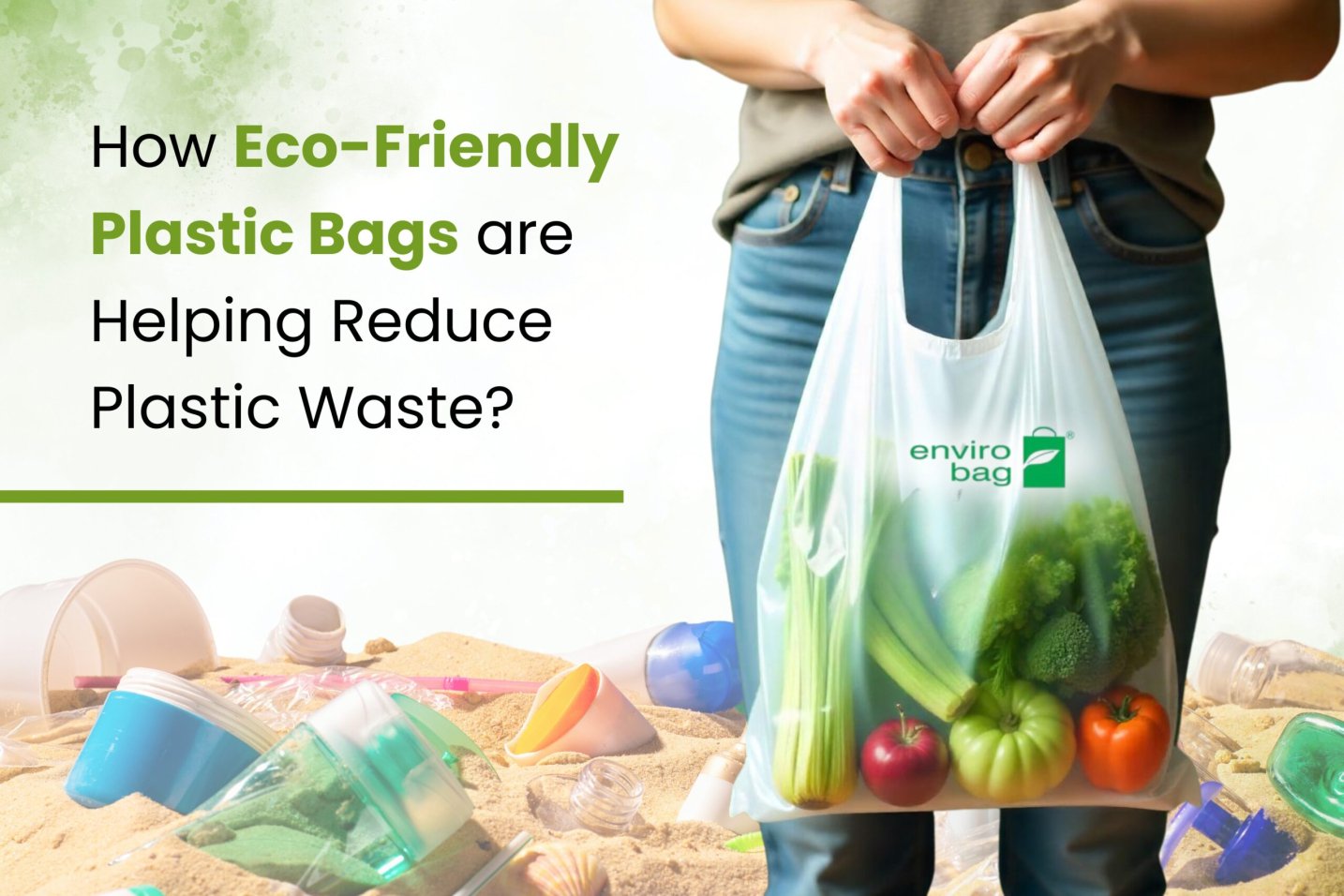Plastic waste is a serious environmental issue worldwide. Traditional plastic bags take hundreds of years to break down, polluting landfills, water bodies, and even the air.
They block drainage systems, harm wildlife, and contribute to climate change. To reduce these problems, enterprises are shifting to eco-friendly plastic bags, which decompose faster and cause less environmental harm.
Many industries prefer compostable bags & to meet environmental standards, especially in packaging, retail, and logistics. These bags break down naturally, reducing pollution and supporting sustainability. Unlike regular plastic, compostable and biodegradable alternatives lower the carbon footprint and help enterprises meet eco-friendly regulations.
In this blog, we shall provide more information about how eco-friendly plastic bags help decrease plastic waste and why enterprises should consider them.
The Problem with Traditional Plastic Bags
Traditional plastic bags are made from non-biodegradable materials such as polyethylene and polypropylene. These materials require hundreds of years to break down, usually releasing microplastics into the environment. The main problems which are linked with using conventional plastic bags include:
- Long Decomposition Period: Plastic bags can degrade for up to 500 years, greatly contributing to environmental pollution.
- Harm to Marine Life: Millions of marine animals die each year due to plastic ingestion or entanglement.
- Landfill Overload: Plastic waste takes up considerable landfill space, worsening waste management challenges.
- Harmful Chemical Release: When plastic decomposes, it releases toxic chemicals that pollute soil and water bodies.
Given these harmful effects, the demand for sustainable alternatives has risen.
Eco-Friendly Plastic Bags: The Smart Choice for a Greener Future
Eco-friendly plastic bags are made from biodegradable or compostable materials. These bags break down naturally, often within months, without leaving toxic residues. Here’s how they contribute to reducing plastic waste:
1. Faster Decomposition
Unlike conventional plastics, compostable bags decompose within a few months when exposed to environmental conditions. They are made from cornstarch, polylactic acid (PLA), and other plant-based compounds that naturally break into organic matter.
2. Lower Carbon Footprint
The production of eco-friendly plastic bags generates significantly lower carbon emissions than traditional plastic bags. Since these bags are often derived from renewable resources, they decrease dependence on fossil fuels.
3. Minimal Microplastic Pollution
Traditional plastic bags degrade into microplastics that persist in the environment, harming wildlife and humans. Biodegradable bags do not contribute to microplastic pollution, making them a safer alternative.
4. Regulatory Compliance
With increasing government regulations on plastic waste, businesses must comply with eco-friendly packaging standards. Many regions have banned single-use plastics, making compostable bags a go-to choice for sustainable packaging solutions.
5. Sustainable Resource Utilization
Many eco-friendly plastic bags are produced using natural, renewable resources such as cornstarch, cassava, and sugarcane. This reduces dependency on petroleum-based plastics, contributing to a circular economy.
6. Safer for Wildlife
Animals, mainly marine life, often misinterpret plastic for food, leading to fatalities. Compostable bags degrade naturally without causing harm, reducing the dangers associated with plastic pollution in oceans and natural habitats.
7. Energy-Efficient Manufacturing
Compared to conventional plastic production, manufacturing biodegradable plastic bags requires less energy, leading to reduced industrial carbon emissions and more sustainable industrial practices.
8. Improved Waste Management
As compostable bags break down quickly in composting facilities, they incorporate seamlessly into organic waste disposal systems, decreasing landfill dependency and encouraging better waste management solutions.
9. Encourages Consumer Awareness and Responsibility
By using eco-friendly grocery bags, enterprises encourage shoppers to be more mindful of their environmental impact. This shift in consumer behavior supports long-term sustainability goals.
10. Adaptability for Various Industries
Eco-friendly plastic alternatives are versatile and can be used across multiple sectors, including retail, hospitality, and food packaging. Enterprises in different industries can find suitable options that meet their needs while maintaining environmental responsibility.
Why Businesses Should Switch to Eco-Friendly Plastic Bags?
Adopting eco-friendly plastic bags not only benefits the environment but also provides several advantages to businesses:
1. Enhanced Brand Reputation
Consumers are becoming more eco-conscious and prefer brands that prioritize sustainability. Businesses that switch to compostable bags showcase their commitment to environmental responsibility, strengthening their brand image.
2. Increased Customer Loyalty
Customers are more likely to support businesses that align with their values. Offering compostable bags can increase customer loyalty and encourage repeat business.
3. Competitive Advantage
With sustainability becoming a key differentiator, businesses using ecofriendly plastic bags gain an edge over competitors who continue to rely on conventional plastics.
4. Improved Operational Efficiency
Using biodegradable alternatives can simplify waste management processes, reducing costs associated with waste disposal and recycling.
5. Attracting Eco-Conscious Investors
Businesses demonstrating a strong commitment to sustainability are more likely to attract investors who prioritize Environmental, Social, and Governance (ESG) criteria.
6. Meeting Corporate Social Responsibility (CSR) Goals
Switching to compostable bags aligns with CSR initiatives, helping businesses fulfill their sustainability commitments and contribute positively to society.
7. Future-Proofing Business Operations
As regulations tighten and consumer preferences shift, transitioning to ecofriendly plastic bags now ensures businesses remain ahead of the curve, avoiding last-minute compliance struggles and outdated packaging solutions.
Make the Smart Choice
By selecting eco-friendly plastic bags, enterprises can improve their brand image, attract eco-conscious customers, and comply with government regulations.
At Envirobag, we care about our planet. Using eco-friendly plastic bags instead of traditional plastic helps reduce pollution and protect nature. Regular plastic bags take centuries to decompose, harming wildlife and the environment, while our compostable bags break down naturally and do not harm the planet.
Our compostable bags decompose naturally, leaving no harmful waste behind. What sets us apart is our commitment to quality, innovation, and sustainability. As one of the leading biodegradable plastic bags manufacturers in India, we provide strong, safe, and eco-friendly alternatives for businesses. Make the switch to compostable bags – a small change, big impact.

 Cart is empty
Cart is empty 
